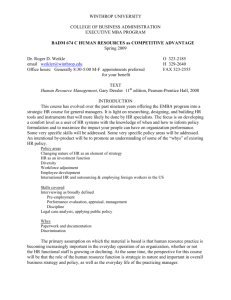Human Resource Management - iba - mba program
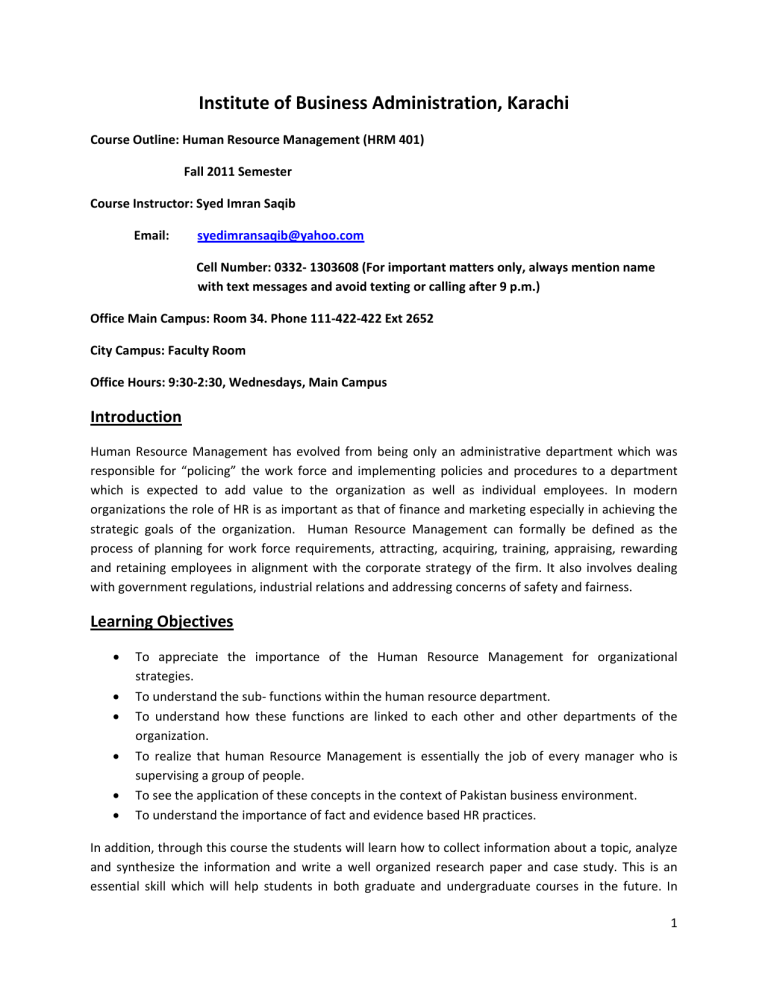
Institute
of
Business
Administration,
Karachi
Course Outline: Human Resource Management (HRM 401)
Fall 2011 Semester
Course Instructor: Syed Imran Saqib
Email: syedimransaqib@yahoo.com
Cell Number: 0332 ‐ 1303608 (For important matters only, always mention name with text messages and avoid texting or calling after 9 p.m.)
Office Main Campus: Room 34.
Phone 111 ‐ 422 ‐ 422 Ext 2652
City Campus: Faculty Room
Office Hours: 9:30 ‐ 2:30, Wednesdays, Main Campus
Introduction
Human Resource Management has evolved from being only an administrative department which was responsible for “policing” the work force and implementing policies and procedures to a department which is expected to add value to the organization as well as individual employees.
In modern organizations the role of HR is as important as that of finance and marketing especially in achieving the strategic goals of the organization.
Human Resource Management can formally be defined as the process of planning for work force requirements, attracting, acquiring, training, appraising, rewarding and retaining employees in alignment with the corporate strategy of the firm.
It also involves dealing with government regulations, industrial relations and addressing concerns of safety and fairness.
Learning Objectives
To appreciate the importance of the Human Resource Management for organizational strategies.
To understand the sub ‐ functions within the human resource department.
To understand how these functions are linked to each other and other departments of the organization.
To realize that human Resource Management is essentially the job of every manager who is supervising a group of people.
To see the application of these concepts in the context of Pakistan business environment.
To understand the importance of fact and evidence based HR practices.
In addition, through this course the students will learn how to collect information about a topic, analyze and synthesize the information and write a well organized research paper and case study.
This is an essential skill which will help students in both graduate and undergraduate courses in the future.
In
1
addition, this introductory HR course is also aimed at helping students to decide if they want to pursue a major in HR.
Syllabus
Sessions 1 and 2 : Introduction to Human Resource Management
Introduction to the class
Discussion of the course outlines
Developing Groups
Introduction to Human Resource Management.
Importance to all managers
Staff and Line Rules
Reading: Chapter 1 (Dessler and Varkkey)
Sessions 3: Strategy and Human Resource Management
Overview of Strategic Management
How HR strategy should be aligned to the Corporate Strategy
Evolution of HR in Pakistan
Reading: If HR were really strategically proactive: Present and Future Directions on HR’s contribution to
Competitive Advantage.
Wayne Brockbank, Human Resource Management.
Session 4: Introduction to Research in Organizational Studies
For this session students will be required to read and bring a research paper to class on any area of human resource management.
Groups should also bring to class tentative ideas about their term projects.
What is a literature review?
Why is it conducted?
Research Paradigms and overview of research methods
Session 5 and 6: Job Analysis
Why conduct a job analysis?
Methods of conducting a job analysis survey
Writing Job Descriptions and Job Specifications.
Reading: Chapter 4 (Dessler and Verkey)
Sessions 7 and 8: Human Resource Planning and Recruiting
Forecasting for Human Resources
2
Need for effective recruitment
Methods of Recruitment
Internal and External Recruitment
Recruitment Websites.
Reading: Chapter 5 (Dessler and Varkey)
Sessions 9 and 10 : Employee Testing and Selection
Importance of Selection
The vital concepts of Validity and Reliability
Types of tests
Different selecting methods
Reading: Chapter 6 (Dessler and Varkey)
Sessions 11 and 12: Interviewing Candidates
Types of Interviews
Structured and Unstructured
Administrating
Interview Biases
Readings: Chapter 7: Interviewing Candidates (Dessler and Varkey),
Article: Stubborn Reliance on Intuition and Subjectivity in Employee Selection by Scott
Highhouse.
Industrial Organizational Psychology .
Session 13 and 14: Training and Development of Employees
Due: Essay/ Literature Review (Part 1 of the Term Project)
Needs Assessment
Importance of Orientation
Types of Training Programs
Management Development Programs
Evaluating Training Efforts
Reading: Chapter 8 (Dessler and Varkkey)
Sessions: 15, 16 and 17: Performance and Talent Management
Importance of Performance management and appraisals
How to conduct performance appraisals
Techniques of Performance appraisal
Coaching Careers and Talent Management
3
Reading: Chapter 9 (Dessler and Varkkey)
Handout: Coaching, Careers and Talent Management
Sessions 18, 19 and 20: Compensation , Incentives and Benefits.
Pay and Strategy
Establishing Pay rates
Incentives and Motivation
Benefits and Services
Readings: Chapter 11 and 12 (Dessler and Varkey)
Sessions 21 and 22: Labor Relations and Collective Bargaining
Overview of Unions and Collective Bargaining
Collective Bargaining Process
Union Movement in Pakistan
Labor rights: Wages, Working Conditions, Safety etc.
Reading: Chapter 15 Labor Relations and Collective Bargaining (Dessler and Varkkey)
Sessions 23 and 24: Workforce Diversity, Fairness and Work life Balance
What is work life Balance (WLB)?
WLB as an issue for men and woman
Importance of fairness and justice of the HR systems
Why is workforce diversity an important issue for managers
Discussions will be based on articles, handouts given in the class.
Session 25 and 26: Comprehensive Case Studies to Synthesize HR Concepts
Readings: Harvard Business School Case Studies: Samsung,
Infosys India
Sessions 27 and 28: Student Presentations and Course Review
Grading Scheme
Literature Review, Case Study and Presentations 20%
Assignments 5%
Quizzes 5%
4
Class Participation 10%
Midterms 30%
Finals 30%
Guidelines for the Term Project (20%)
Students are required to select a topic within the realm of human resource management.
The topic should be discussed with the instructor in groups for approval.
This project is divided into three components: Literature Review, Case Study and Final Presentation.
Literature Review: (8 Marks)
Conduct a comprehensive literature review of about 10 ‐ 15 research papers from renowned journals.
For this you have to utilize the databases available on the IBA portal.
You have to learn to navigate through these databases keeping in mind that not articles are freely available.
As students of research this is an activity that all of us should be well versed with.
Make sure that the research papers are consistent with your specific topic.
After this, students will be required to write a 10 page essay on their chosen topic (12 font and double spaced) following the in ‐ text
APA style citations.
This is due on the 14 th
session of the class.
Case Study (8 marks)
The second part of this project would be conducting primary research on the topic in a organization of your choice.
Students may choose to do this through, in ‐ depth interviews, questionnaires or other methods.
The purpose of this activity is to encourage students to observe and appreciate the real life application of the topic which they have seen for review.
This is also a 10 page case study (12 font and double spaced) excluding any exhibits and appendices.
This is due on the 27 th
Session of the class.
Every day that the submission is late will lead to deduction of 1 mark.
Presentations (4 Marks)
The students will make formal yet engaging presentations about their findings
The project will be made in groups of 3 ‐ 4, randomly assigned by the instructors.
All submissions should include a contributions page.
Assignments (5)
All assignments will be done in class.
Students may be asked to prepare for the assignment from home but the written part of the assignment will be done in class.
This could be a mini case study, an analysis of a situation or an exercise.
5
Quizzes (N ‐ 1) (5)
There will be a total of 4 quizzes based on either the material covered in the previous class or material covered in class.
Best 3 quizzes will be included in the final scores.
Class Participation (10)
As management students and as soon to be business leaders students are expected to confidently express their opinions.
Students will be graded on their willingness to participate, quoting from the assigned readings, bringing in examples of involved points from outside resources and most importantly respectfully listening to the opinions of fellow students.
In addition, students may be asked to make impromptu presentations or participate in role plays or debates.
Apart from the class participation score, class participation enhances learning and retention, makes the class more interesting for you.
Reading for class is imperative is it helps us move from merely explaining what is contained in the text to analyzing and critiquing the text.
In addition, points reflecting application to the Pakistani environment would be highly appreciated .
Finally it should be kept in mind that not everything contained in the text can be covered in the class.
Therefore students are expected to cover these topics and make use of counseling hours to clarify these concepts or raise questions in class.
The students will be given a class participation grade and feedback every month and the final grade on
CP would be an average of these scores.
Guest Speaker Sessions
The students as well as myself would arrange guest speaker session on different topics.
Reading Materials
Main Text: Human Resource Management Gary Dessler and Biju Varkkey, 12 th
Edition, Pearsons
Reference Text: Human Resource Management, Robert L.
Mathis and John H Jackson 10 th
Edition
Handouts, Articles and Cases as listed in the syllabus above.
Good Luck and Enjoy the Class!
6
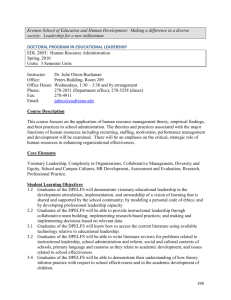

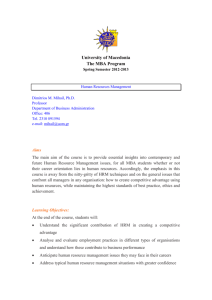
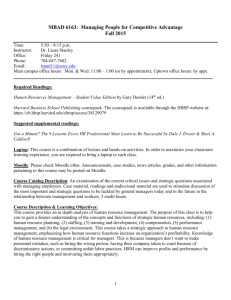
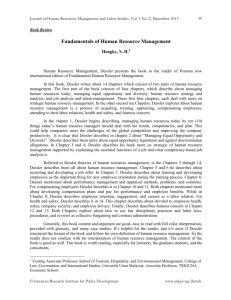

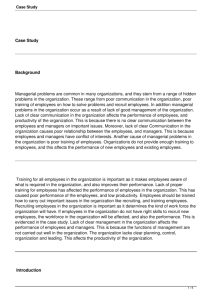
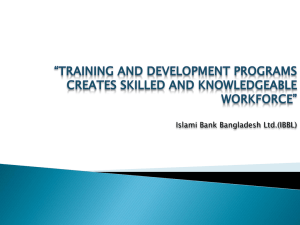
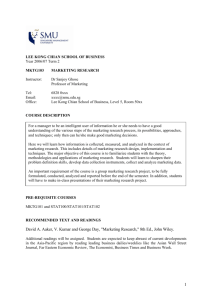
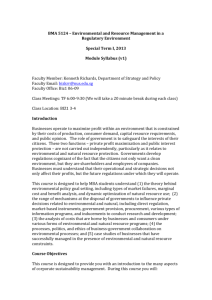
![Labor Management Relations [Opens in New Window]](http://s3.studylib.net/store/data/006750373_1-d299a6861c58d67d0e98709a44e4f857-300x300.png)
